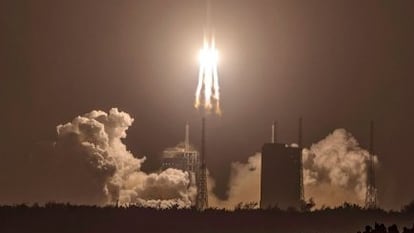A man-made object weighing four tons is about to hit the Moon, and nobody knows for a fact whose it is
Nobody is 100% certain who launched the object, which was due to hit the far side of Earth’s natural satellite on March 4

It may sound anecdotal, but it is one of those anecdotes that illustrate a problem perfectly. A man-made object weighing four tons is about to hit the Moon, and nobody knows for a fact whose it is.
For the first time in history, part of a rocket is about to accidentally collide with the Earth’s natural satellite and it will not be possible to attribute it to any one party with 100% certainty. In any case, all calculations point to a collision on Friday, March 4 at around 7.25am Eastern Time (12.25pm UTC). The object is expected to impact the Hertzsprung crater, on the far side of the Moon, which means that it will be impossible to witness the collision.
At first it was believed to be the upper stage from a Falcon 9 rocket that carried the Deep Space Climate Observatory (DSCOVR) satellite into space in 2015. This rocket was made by SpaceX, the company owned by the celebrity entrepreneur Elon Musk. But NASA later said that this object did not travel far enough to fall under the Moon’s influence, and that it was more likely a Chinese rocket associated with the Chang’e 5-T1 lunar test mission, launched in October 2014. China has denied ownership of the object.
The impact itself will be of little consequence, and NASA has said it could be weeks before it becomes visible. But it does send out a message about what’s going on in space. “Traffic in deep space is increasing. And it’s not like the old days with just the USA and the USSR sending stuff to deep space, it’s many countries and even commercial companies like SpaceX. So I think it’s time for the world to get more serious about regulating and cataloging deep space activity,” writes the astronomer Jonathan McDowell, of the Harvard-Smithsonian Center for Astrophysics.
Other experts agree. “It’s a perfect metaphor to understand that we’re sending objects to a place that was pristine until 70 years ago and that we now run the risk of destroying it. It’s like the Wild West,” says Alberto Águeda, coordinator of space surveillance programs at GMV, a company that monitors space junk. “Our entire lives depend on satellites, and a time will come when we will not be able to launch more because it will be unsafe.”
Lunar adventures
It will be the first collision of a man-made object not deliberately targeted at the Moon. Before this, a few missions had crashed there on purpose, including a privately funded Israeli spacecraft that carried tiny organisms known as tardigrades, in breach of international protocols against contamination.
“We’re seeing more and more problems of this nature, because there’s more launches all the time and more space junk that we should be worrying about,” says Águeda, who works with a team of over 70 engineers to monitor this junk. “Whatever is beyond the Moon had not been viewed as a problem, until now that is.”
But that is going to change this year: there are over half a dozen lunar missions being put together by several countries in 2022 alone.
Tu suscripción se está usando en otro dispositivo
¿Quieres añadir otro usuario a tu suscripción?
Si continúas leyendo en este dispositivo, no se podrá leer en el otro.
FlechaTu suscripción se está usando en otro dispositivo y solo puedes acceder a EL PAÍS desde un dispositivo a la vez.
Si quieres compartir tu cuenta, cambia tu suscripción a la modalidad Premium, así podrás añadir otro usuario. Cada uno accederá con su propia cuenta de email, lo que os permitirá personalizar vuestra experiencia en EL PAÍS.
¿Tienes una suscripción de empresa? Accede aquí para contratar más cuentas.
En el caso de no saber quién está usando tu cuenta, te recomendamos cambiar tu contraseña aquí.
Si decides continuar compartiendo tu cuenta, este mensaje se mostrará en tu dispositivo y en el de la otra persona que está usando tu cuenta de forma indefinida, afectando a tu experiencia de lectura. Puedes consultar aquí los términos y condiciones de la suscripción digital.









































